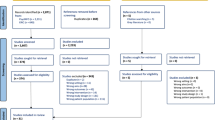Abstract
For many students, the transition from elementary school to middle school is beset with a variety of social, emotional, and logistical stressors. In addition, many students lack the skills and self-confidence that they need in order to negotiate successfully these predictable changes and challenges. This paper examines a 3-day social problem-solving and stress reduction curriculum. An evaluation involving 308 students from six elementary schools indicated that 94% found the program helpful.
Similar content being viewed by others
References
Botivin, G. J., & Wills, T. A. (1985). Personal and social skills training: Cognitive-behavioral approaches to substance abuse prevention. In C. S. Bell & R. Battjes (Eds.),Prevention research: Deterring drug abuse among children and adolescents (Nida Research Monograph 63, pp. 8–49). Washington, DC: U.S. Government Printing Office.
Cowen, E. L. (1977). Baby steps toward primary prevention.American Journal of Community Psychology.5, 1–22.
Elias, M. J., Clabby, J., Corr, D., Ubriaco, M., & Schuyler, T. (1982). The improving social awareness-social problem solving project: A case study in school-based action research (Action Research Workshop Report No. 4) New York: William T. Grant Foundation.
Elias, M. J., Gara, M., & Ubriaco, M. (1985). Sources of stress and support in children's transition to middle school: An empirical analysis.Journal of Clinical Child Psychology, 14 112–118.
Elias, M. J., Gara, M., Ubriaco, M., Rothbaum, P. A., Clabby, J. F., & Schuyler, T. (1986). Impact of a preventive social problem solving intervention on children's coping with middle school stressors.American Journal of Community Psychology, 14 259–275.
Gilchrist, L. D., & Schinke, S. P. (1985). Improving smoking prevention programs.Journal of Psychosocial Oncology, 3 67–78.
Gilchrist, L. D., Schinke, S. P., Snow, W. H., Schilling II, R. F., & Senechal, V (1988). The transition to junior high school: Opportunities for primary prevention.Journal of Primary Prevention, 8 99–108.
Schinke, S. P., & Gilchrist, L. D. (1984).Life skills counseling with adolescents. Baltimore: University Park Press.
Snow, W. H., Gilchrist, L. D., Schilling, R. F., Schinke, S. P., & Kelso, C. (1986). Preparing for junior high school: A transition training program.Social Work in Education, 9 33–43.
Additional information
David W. Hellem, MSW, LCSW, CAC is Coordinator of Consultation and Education Services at the Northwest Center for Community Mental Health (Reston, Virginia). Reprint requests should be addressed to the author at the Northwest Center, 1850 Cameron Glen Drive, Reston, VA 22090.
Rights and permissions
About this article
Cite this article
Hellem, D.W. Sixth grade transition groups: An approach to primary prevention. J Primary Prevent 10, 303–311 (1990). https://doi.org/10.1007/BF01326624
Issue Date:
DOI: https://doi.org/10.1007/BF01326624




